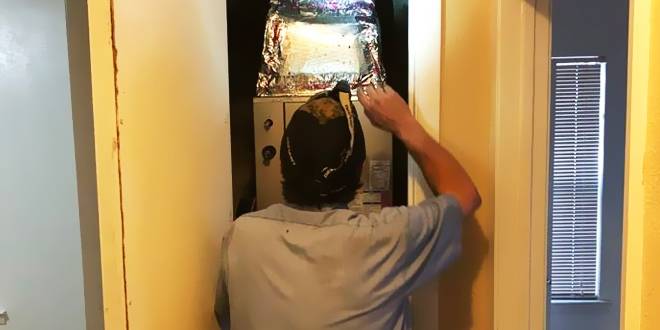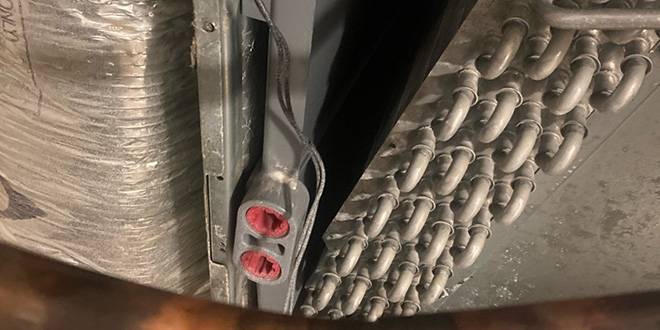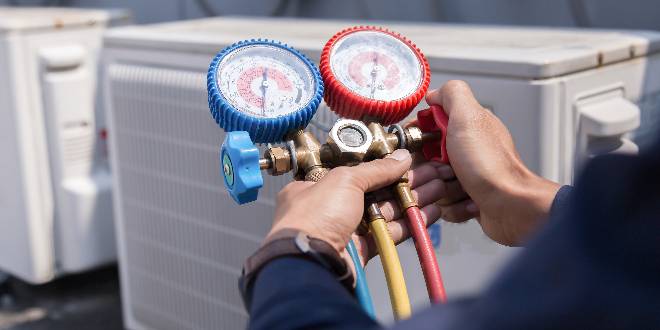
Are you puzzled by the noises coming from your HVAC unit? This brief guide is designed to help local homeowners and businesses in Irving, TX, interpret these sounds, aiding in early detection and resolution of potential HVAC issues.
Decoding Common HVAC Noises
HVAC systems, central to comfort in homes and businesses, can sometimes communicate their needs through the noises they make. Understanding these sounds is key to maintaining your HVAC’s health and efficiency. Here’s a breakdown of common HVAC noises and what they might signify:

Banging or Clanking
This often indicates a loose or broken part inside the air handler or furnace. Components like the connecting rod, piston pin, or crankshaft could be loose. In compressors, this might suggest an unbalanced indoor blower. Immediate attention from a professional is recommended to avoid more serious damage.
Solution: Immediate Professional Check
These sounds often indicate a severe mechanical issue, such as a loose or broken part inside the air handler or furnace. Do not attempt to fix this yourself. Turn off your heating and air conditioning system and contact a professional technician for a safe and accurate diagnosis and HVAC repair.
Squealing or Screeching
These noises typically point to belt-driven components. If you hear a squealing sound, it could be a belt slipping or wearing out. Some systems use direct-drive motors, and squealing in these systems might indicate a failing motor bearing. Regular maintenance can help identify these issues before they escalate.
Solution: Professional Inspection
Squealing or screeching noises are typically related to belt-driven components or motor bearings. While you can check if the belt is visibly damaged or misaligned, replacing or repairing these components is best left to professionals due to the risk of further damage.
Rattling
Rattling sounds often suggest minor issues like loose panels or screws. However, it could also signal a more serious problem, particularly if the noise intensifies with fan operation. This could be indicative of a failing motor or unsecured fan blades. Regular inspections can help tighten these components and prevent further complications.
Solution: Secure Loose Panels
If the rattling noise is mild, it might be due to loose panels or screws. You can safely check and tighten any accessible panels on the HVAC unit. However, if the rattling noise is loud or persistent, especially when the fan is running, it’s best to seek professional assistance as it could indicate a more serious internal issue.
Clicking
Persistent clicking, especially during operation or startup, could signal electrical issues, such as a faulty relay. Occasional clicking is normal, but consistent or loud clicking sounds warrant a professional evaluation to prevent potential electrical failures.
Solution: Check the Thermostat and Power Supply
Ensure your thermostat is set correctly and the power supply to the HVAC system is stable. If the clicking continues, it could be a more serious issue, requiring professional diagnosis.
Humming
While not always a sign of a serious problem, humming should not be overlooked. It can indicate loose internal components or electrical issues. If accompanied by reduced heating or cooling performance, this points to a more pressing concern. Timely inspection by a technician can diagnose and rectify the issue before it escalates.
Solution: Visual Check for Loose Parts
A humming noise can sometimes be addressed by ensuring all visible parts are secure and there are no loose connections. However, since it can also indicate deeper electrical issues if the humming noise continues or the system’s performance is affected, contact a technician for a thorough inspection.
Buzzing
Buzzing sounds are usually electrical in nature and could stem from issues like loose wiring, failing motors, or malfunctioning capacitors. Given the potential risks associated with electrical problems, immediate attention from a qualified professional is necessary to ensure safety and prevent further damage.
Solution: Inspect for Obvious External Issues
Look for any visible signs of wear, loose parts, or debris around the unit. However, as buzzing noises often point to electrical issues, it’s crucial to avoid touching any electrical components. If the buzzing noise persists or you’re unsure of the cause, call a professional for a detailed examination.
Whistling or Hissing
These noises may indicate airflow issues, such as ductwork leaks or blockages, which can impact the efficiency of your HVAC system. Another cause could be a refrigerant leak, especially if there’s a noticeable decline in cooling performance. Professional assessment is recommended to accurately diagnose and address these problems.
Solution: Check Airflow
If you hear whistling or squealing, check for any blockages in your ducts or vents. Make sure they are not covered or obstructed by furniture or debris. If the issue persists, contact a technician, as it might indicate high refrigerant pressure or a failing compressor.
Chattering or Rattling Before Starting
If you hear chattering or rattling noises before your system starts, it could be an indication of a failing thermostat or compressor issues. Often a precursor to system failure, these sounds should be promptly investigated by a technician to avoid a full system breakdown.
Solution: Inspect the Thermostat and Electrical Connections
For chattering or rattling noises before starting, first check your thermostat settings and ensure they are correct. Inspect any accessible electrical connections for signs of looseness or wear.
Thwapping
If you hear a sound like “thwapping,” it might be something stuck in the blower’s fan blades. This noise typically comes and goes with airflow. While it may not be critical to the furnace’s functioning, the obstructing object could cause unnecessary wear and tear on the unit.
Solution: Check for Obstructions
If you hear a thwapping sound, briefly inspect the blower for visible obstructions. If something is stuck in the fan blades, turning off the unit and carefully removing the object can resolve this issue.
Popping
Popping sounds often originate from your ductwork, especially when the heat hasn’t been on for a while. This noise is caused by cold metal ducts expanding due to the influx of warm air. However, if the popping sound comes from a different source or persists, it might be time to call a technician.
Solution: Inspect Ductwork
Popping sounds are often due to temperature changes in the ductwork. While this is generally not a cause for concern, if the noise is persistent, it might indicate a more serious issue. A professional inspection can ensure there are no underlying problems.
Booming
A booming sound, particularly from the furnace, could indicate a struggle in lighting from a pilot light or electronic ignition, often due to gas build-up in the combustion chamber. This situation is not ideal and should be inspected and cleaned by a professional. Booming noises can also result from carbon particle build-up and sudden combustion.
Solution: Immediate Professional Check
Booming sounds, especially from the furnace, can indicate a dangerous buildup of gas. This is not a situation for DIY solutions. Turn off your system and contact an HVAC technician immediately for a thorough inspection and repair.
Grinding
Grinding noises can be caused by several issues: dirt and debris in the system, damaged blower fan bearings or blades, a damaged AC compressor valve, or worn condenser fan bearings. These sounds suggest significant mechanical issues that require professional attention.
Solution: Professional Assessment
Grinding noises usually indicate a serious issue with mechanical components. Turn off your HVAC system to prevent further damage, and contact a professional. These issues are complex and require technical expertise.
Dripping Noises
Uncommon but important, dripping sounds could indicate a refrigerant leak or issues in your ducts. In air conditioners, this sound can also occur when moisture pulled from the air collects in the drip pan and does not drain properly, leading to condensation. Checking the drain tube for blockages and ensuring proper flow can address this issue.
Solution: Check the Drip Pan
For dripping sounds, inspect the drip pan under the AC unit for excess water. Ensure the drain is not clogged. If you find a blockage, gently clear it. If the problem persists or you’re unsure, it’s best to call a technician.
Specific Conditions for Different Types of Systems
Understanding that different HVAC systems have unique characteristics and sounds is key to proper maintenance and troubleshooting. Here’s what you should know:
- Furnaces: Booming, popping, or rattling noises in furnaces often indicate ignition problems or ductwork expansion. Regular cleaning and inspection of the ignition system and ducts are essential.
- Air Conditioners: Buzzing and hissing sounds can indicate refrigerant leaks or compressor issues. Ensure your air conditioner is regularly checked for leaks and compressor health.
- Boilers: Boilers can make clunking, banging, whistling, and gurgling noises, often due to scale build-up, trapped air, or sediment blockage. Regular descaling and air bleeding are important.
- Heat Pumps: Humming or grinding noises in heat pumps may suggest motor or compressor problems. Periodic heat pump checks for mechanical wear and proper lubrication are recommended.
Preventive Measures and Maintenance Tips

Regular maintenance can prevent many common noisy HVAC system issues. Here are some tips:
- Regular Inspections: Schedule annual professional inspections to catch and address issues early.
- Clean and Replace Filters: Regularly clean or replace your system’s air filter to prevent airflow problems and maintain system efficiency.
- Clear Vents and Ducts: Ensure vents and ducts are clear of obstructions to maintain proper airflow.
- Check Refrigerant Levels: For air conditioners and heat pumps, ensure refrigerant levels are checked and refilled as necessary.
- Lubricate Moving Parts: Regular lubrication of motors and bearings can prevent squealing or grinding noises.
- Inspect Electrical Connections: Have a technician check electrical connections during routine maintenance to prevent buzzing or clicking sounds.
Safety Precautions
Safety is paramount when dealing with HVAC systems. Keep these precautions in mind:
Turn Off Power: Always turn off power to the unit before performing any checks or maintenance.
- Don’t Touch Electrical Components: Avoid handling electrical parts. Electrical issues should only be addressed by professionals.
- Gas Safety: If you suspect a gas leak or if there are booming sounds from your furnace, turn off the unit and call a technician immediately.
- Refrigerant Handling: Never attempt to refill refrigerant yourself. This should only be done by a certified technician.
- Call for Professional Help: If you’re unsure about any aspect of your HVAC system’s functioning, it’s safer to consult a professional technician.
By following these guidelines, you can ensure your HVAC system remains in optimal condition, providing efficient and safe operation year-round. Regular maintenance not only prevents breakdowns but also extends the lifespan of your system.
Ready for Peace of Mind?
🌟 Take action today! Ensure your HVAC system’s longevity and efficiency with Spencer Air Conditioning and Heating. Expert solutions are just a call away! 📞 Experience premier service tailored to your unique needs in Irving, TX. Embrace a worry-free environment by scheduling your maintenance or consultation now! Your comfort is our commitment. 🏡💼🔧




